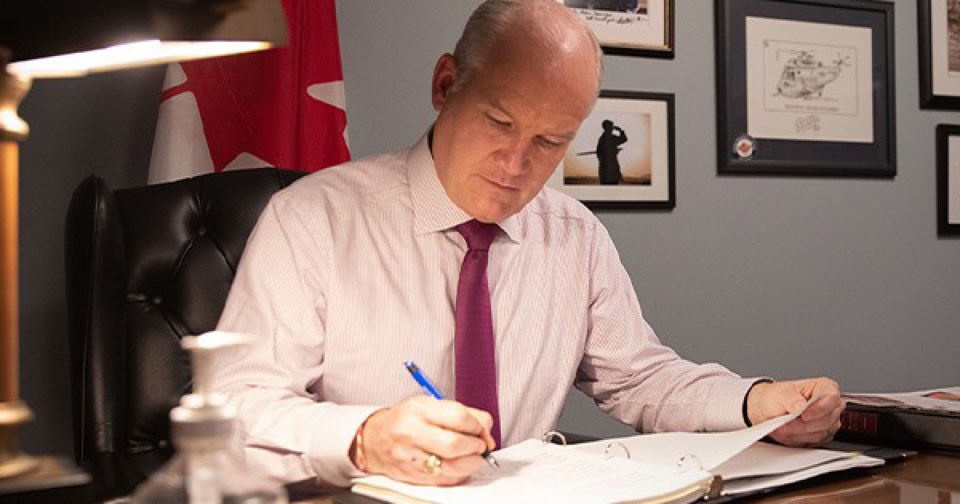The moment it was revealed that one-third of Conservative Party MPs had filed a notice to have Erin O’Toole removed as party leader, you knew that he was finished.
Even if he would have survived that vote by Tory MPs, his days would have been numbered. He wasn’t going to remain as leader with so many MPs wanting him out.
And now the Tories will have a leadership race for the third time since former prime minister Stephen Harper stepped down following his 2015 election defeat.
Let me preface this by saying the leader of the Conservative Party has an incredibly tough job, as does any party leader. The Conservative Party has the proverbial “large tent” of supporters, ranging from the small-C conservatives to those on the far right, although that number has been a diminishing percentage within the party.
One of the biggest challenges that any Conservative Party leader has is coming up with policies that provide olive branches to all factions within the party.
Of course, it’s a challenge that faces all party leaders in Canada, whether they be left, right or centrist.
But in the end, the objective of a Conservative Party leader is to become prime minister. Expectations are much higher than the Green Party, the People’s Party of Canada or even the federal New Democratic Party.
But to become prime minister, you can’t fashion yourself as a strong conservative.
For the Conservative Party to form and remain as government, they have to start from the centre and move gradually to the right with their policies and budgeting. It’s one thing to be an ardent social conservative, but if self-preservation is a quality you possess, you can’t govern like one.
This is why Stephen Harper stayed as prime minister for so long. He wasn’t as conservative as he wanted to be, nor was he as his opponents or many of his supporters wanted him to be.
O’Toole tried to move the party more towards the centre, even though many party members wouldn’t be happy. Political idealism is hard to abandon, even if the party improves its chances of forming government.
Ultimately, though, O’Toole’s problem was execution. He introduced a price on carbon. He tried to spin it, but to so many supporters, it was a carbon tax. He wavered badly on firearms issues in the election. And he struggled when it came to COVID-19 vaccine policies for members of his caucus and even the Freedom Convoy in Ottawa.
The flip flops hurt, not just with members of the party, but the independent voters who were undecided on whether to vote Tory.
People will compare him to his predecessor Andrew Scheer. But there’s a big difference: Scheer lost an election in 2019 that he should have won. O’Toole had basically the same result two years later that few gave him a chance of winning.
So the Tories find themselves in another leadership race. Expect a deeper and stronger field than the last race in 2020, when there were four candidates. I doubt you’ll see 14 candidates like in 2017, but there is lots of interest.
Pierre Poilievre has declared his intentions, and is the favourite of many, thanks to his bluster and strong leadership skills. He’s combative, entertaining and charismatic. It’s not easy being a conservative in Ottawa, but the question is if he’s going to be too polarizing, especially in a party leadership race with a preferential ballot.
Leslyn Lewis dazzled people in the last leadership race, and was likely the smartest candidate in the field. Now she has some experience as an MP, while still being a fresh face. She’ll be popular with social conservative supporters, but again, that’s typically not the approach that gets you elected in Canada.
I’ve long maintained that Rona Ambrose is the strongest of the possible candidates, and was outstanding as the interim leader post-Harper. But I’m not sure she wants the job.
And there are other names out there: former Quebec premier and federal Progressive Conservative leader Jean Charest (likely too much of a centrist), and former Ontario PC leader Patrick Brown, who apparently is already prepping his campaign team.
For those hoping former Saskatchewan premier Brad Wall would take a run at the job, it likely won’t happen, although he’s as dynamic and engaging as ever. Why would Wall leave a retirement that he seems to enjoy so much, for a campaign with no guarantee of winning?
This will be an interesting leadership race, to say the least, as the Tories search for that leader who will be Canada’s next prime minister.




